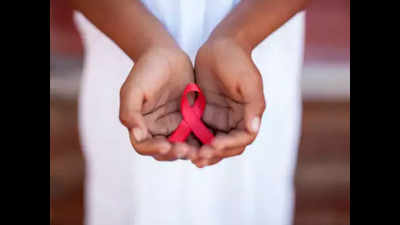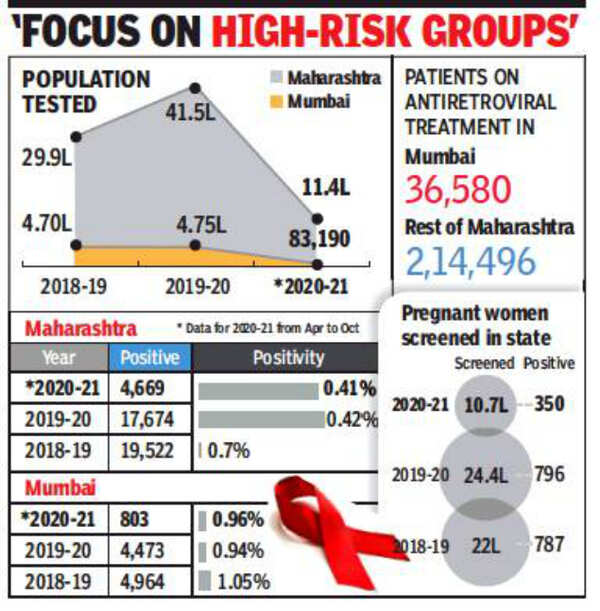- News
- City News
- mumbai News
- 7,000 HIV infections may have gone undetected in Maharashtra during lockdown
Trending
This story is from December 1, 2020
7,000 HIV infections may have gone undetected in Maharashtra during lockdown
Up to 7,000 HIV detections may have been missed in Maharashtra due to inaccessibility of screening services in the early months of the Covid-19 pandemic. Mumbai alone is likely to have missed at least 1,000 cases, giving rise to concerns over a possible spurt in infections if testing is not intensified.

Representative image
MUMBAI: Up to 7,000 HIV detections may have been missed in Maharashtra due to inaccessibility of screening services in the early months of the Covid-19 pandemic. Mumbai alone is likely to have missed at least 1,000 cases, giving rise to concerns over a possible spurt in infections if testing is not intensified.

Data collated by the Maharashtra State AIDS Control Society (MSACS), and shared on the eve of the World AIDS Day on December 1, revealed that between April and October, merely 12.2 lakh HIV tests were carried out.Normally, the state performs over four lakh tests every month, which dropped to as little as 75,000 post the lockdown. This resulted in 5,472 detections between April and October. By comparison, 24,486 HIV cases were found in 2018-19 and 22,147 in 2019-20. In Mumbai, too, testing numbers fell from a monthly average of 38,000 in pre-Covid months to 5,000, particularly between April and June. It has touched around 18,000 since July but is far from normalising.
A senior MSACS official said the average monthly detection of new cases in Maharashtra has hovered between 1,800 and 2,000 in the past two years, which dropped to less than 700 between April and October this year. "Even if we take into account the 10% year-on-year decline in new cases we have been witnessing, we would have still missed out 6,000 cases in rest of Maharashtra and 1,000 in Mumbai due to the pandemic," the official said. It is feared even if testing is intensified in the remaining five months of 2020-21, only half the gap may be covered. The only silver lining is the positivity rate in the state has stayed under 0.5%, while for Mumbai it continues to be little under 1%.
Dr Shrikala Acharya, assistant project director of the Mumbai District AIDS Control society, said the lockdown hit testing and counselling services hard in the initial months as commuting became a challenge. The MSACS official said many of their counsellors and technicians were posted on eight-hour Covid duties, making it difficult to run the Integrated Counselling and Testing Centres. Dr Acharya, though, said MDACS could reach over 60% of their registered patients to deliver drugs for multiple months.
Eldred Tellis, director, Sankalp Foundation, though, said since sex work as well as group drug usage had decreased, infections could have fallen too. "However, people faced immense difficulty to get treatment for HIV-related opportunistic infections," he said, adding he had to shut his decade-old rehabilitation centre for intravenous drug users in Pune as people objected to his travel from Mumbai.
To avert an HIV crisis now, MSACS has asked NGOs to intensify testing at the community level with a focus on high-risk groups. The emphasis will be on the index patient concept where the client of a positive sex worker will be pursued to get tested. Nearly 70,534 such clients were screened till September, of whom 77 were found HIV-positive.

Data collated by the Maharashtra State AIDS Control Society (MSACS), and shared on the eve of the World AIDS Day on December 1, revealed that between April and October, merely 12.2 lakh HIV tests were carried out.Normally, the state performs over four lakh tests every month, which dropped to as little as 75,000 post the lockdown. This resulted in 5,472 detections between April and October. By comparison, 24,486 HIV cases were found in 2018-19 and 22,147 in 2019-20. In Mumbai, too, testing numbers fell from a monthly average of 38,000 in pre-Covid months to 5,000, particularly between April and June. It has touched around 18,000 since July but is far from normalising.
A senior MSACS official said the average monthly detection of new cases in Maharashtra has hovered between 1,800 and 2,000 in the past two years, which dropped to less than 700 between April and October this year. "Even if we take into account the 10% year-on-year decline in new cases we have been witnessing, we would have still missed out 6,000 cases in rest of Maharashtra and 1,000 in Mumbai due to the pandemic," the official said. It is feared even if testing is intensified in the remaining five months of 2020-21, only half the gap may be covered. The only silver lining is the positivity rate in the state has stayed under 0.5%, while for Mumbai it continues to be little under 1%.
Testing dropped among pregnant women too. From an average of 2 lakh tests carried out in 2019-20, it fell to 1.5lakh in 2020-21. Around 350 of them were found to be positive from April to October, less than half of the 800 detected in 2019-20.
Dr Shrikala Acharya, assistant project director of the Mumbai District AIDS Control society, said the lockdown hit testing and counselling services hard in the initial months as commuting became a challenge. The MSACS official said many of their counsellors and technicians were posted on eight-hour Covid duties, making it difficult to run the Integrated Counselling and Testing Centres. Dr Acharya, though, said MDACS could reach over 60% of their registered patients to deliver drugs for multiple months.
Eldred Tellis, director, Sankalp Foundation, though, said since sex work as well as group drug usage had decreased, infections could have fallen too. "However, people faced immense difficulty to get treatment for HIV-related opportunistic infections," he said, adding he had to shut his decade-old rehabilitation centre for intravenous drug users in Pune as people objected to his travel from Mumbai.
To avert an HIV crisis now, MSACS has asked NGOs to intensify testing at the community level with a focus on high-risk groups. The emphasis will be on the index patient concept where the client of a positive sex worker will be pursued to get tested. Nearly 70,534 such clients were screened till September, of whom 77 were found HIV-positive.
End of Article
FOLLOW US ON SOCIAL MEDIA










